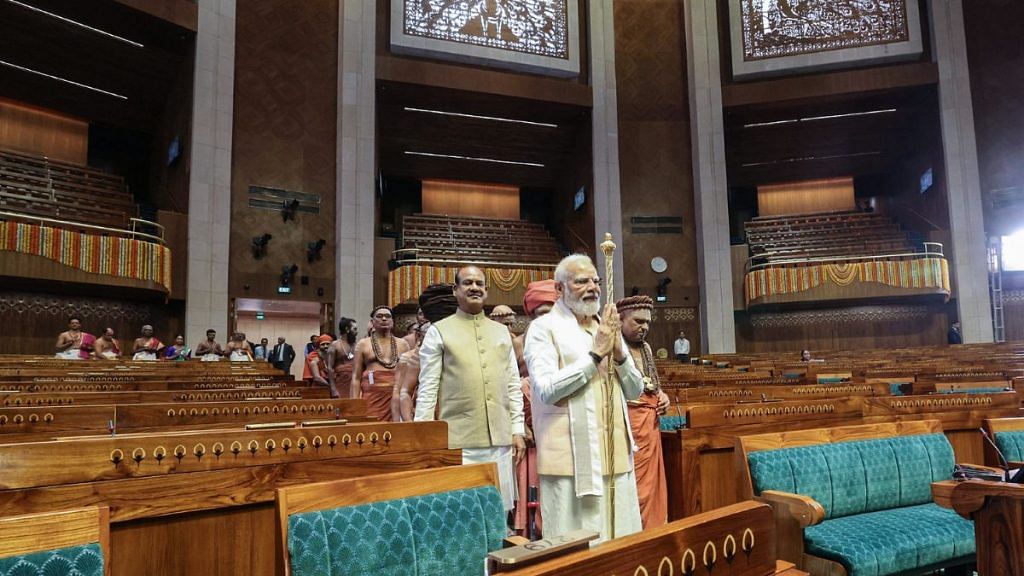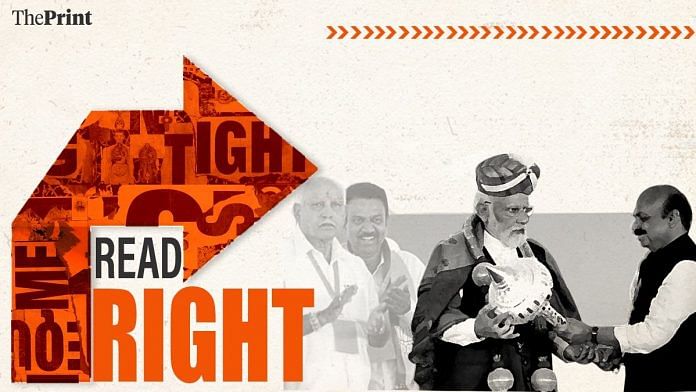New Delhi: The Bharatiya Janata Party’s defeat in the Karnataka assembly elections is a signal that Hindutva ideology and Prime Minister Narendra Modi’s charisma may no longer be “sufficient” for the party to make regional inroads in the run-up to the 2024 Lok Sabha elections, according to an editorial in Rashtriya Swayamsevak Sangh (RSS) mouthpiece Organiser.
“The result of the Karnataka Assembly elections has surprised many, though they are not shocking,” starts the article by Organiser editor Prafulla Ketkar.
“Though extrapolating the outcome in favour of the Congress party to the General Elections 2024 is a daring proposition, it definitely would boost the morale of the opposition in general and the Congress party in particular”, the editorial said.
It added that now was the right time for the BJP to take stock of the situation.
“Prime Minister Modi’s charisma and Hindutva as an ideological glue would not be sufficient,” it noted, adding that such factors are “genuine assets for the BJP only when accompanied by good state-level governance. It went on to outline that the latter seemed to be missing in Karnataka’s former BJP government.
“First time since Prime Minister Modi took the reins at the Centre, the BJP had to defend the corruption charges in an assembly election. The ruling party tried its best to galvanise the voters with national-level programmes, while the Congress tried its best to keep it at the local level,” the editorial said.
“The BJP failed to significantly add to the previous vote share in the high-turnout elections, resulting in poor seat conversion. Anti-incumbency against the sitting Ministers should be a concerning factor,” it added.
Other topics taken up over the last couple of weeks by Hindu Right voices include the installation of the ‘Sengol’ in the new Lok Sabha chamber, the Manipur violence, and the dropping of poet Iqbal from the Delhi University syllabus.
Also Read: ‘Colonial construct’ of hills vs plains is cause of Manipur clashes, says Hindu Right press
Bridging North-South divide with Sengol
When PM Modi inaugurated the new Parliament building on 28 May, one of his most debated actions was installing a ‘Sengol’, a Chola era-styled sceptre, in the Lok Sabha chamber.
Detractors have claimed that the sceptre might be better suited to a royal coronation rather than a ceremony dedicated to democracy. Hindu Right voices, however, have offered varied endorsements of the Sengol’s symbolism.
According to an Organiser piece this week, the Sengol bridges the “artificial Aryan-Dravidian divide”, especially when seen in the context of PM Modi drawing from Tamil traditions and inviting Adheenam godmen.
“These Adheenams have a huge influence on a large chunk of the populace in Tamil Nadu,” it notes.
“Sengol of India can well turn out to be a baton that breaks the walls dividing India and an alpenstock that helps people move closer, thereby catalysing a cultural, civilisational, and political unification of Bharat and Bharatiyas,” it concludes.

Meanwhile, in an editorial published in The Indian Express, RSS ideologue Ram Madhav argued that it was important to stop debating over the “historicity” of the Sengol, but to instead mull its significance as the embodiment of “Dharma Danda”— which he described as an Indian “civilisational tradition” where ethical and spiritual authority hold greater importance than mere political power.
“Unfortunately, the historic occasion is marred by the intransigence of some Opposition parties. Their insistence that the Prime Minister has no authority to inaugurate the new Parliament is facile. The Sengol, representing transfer of power to Indians, was received by Jawaharlal Nehru as the Prime Minister in 1947, even though the president of the Constituent Assembly, Rajendra Prasad, was standing next to him,” Madhav argued.
Madhav further emphasised that prime ministers do not merely represent their respective political parties but the entire nation. Parliament itself, he said, embodies the political authority of the country, with the PM leading that authority.
“As per the Indian coronation rituals, the king, after formally ascending the throne, would proclaim three times: ‘Adandyosmi’, nobody can punish me. The priest would then come forward with his sacred sceptre, Dharma Danda, gently pat on the king’s crown and proclaim three times that ‘Dharma Dandyosi’— meaning ‘Dharma will punish you’,” Madhav wrote.
“The Sengol represented that tradition of the Dharma Danda. In 1947, it did not merely symbolise the transfer of power from the British to Nehru,” he contended.
Also Read: Modi’s Parliament inaugural was an elaborate mimicry. It displayed the sham that is New India
‘Where did Hindus go in Manipur village?’
Amid the ongoing ethnic clashes in Manipur, Vishwa Hindu Parishad (VHP) general secretary Milind Parande claimed in a note released on the organisation’s website that there had been 1,693 incidents of arson and attacks targeting the houses and temples of Meitei, the state’s dominant and primarily Hindu community.
Parande also questioned claims by a tribal students’ organisation that a violence-affected area— Tipaimukh in the tribal-dominated hill district of Churachandpur— comprised only Christians.
The statement in question was issued by the Hmar Students Association in order to refute a former claim by Parande that three temples had been destroyed in Tipaimukh.
In his latest statement, the VHP leader also asked where the Hindus had gone in the area.
“The 2011 Census report gives Christian population to be 94.73%. The 2021 census has not been conducted yet. If there are supposedly no Hindus now, what has happened to the Hindu population? Has anything very bad happened to Hindus so there is no Hindu population existing there now?” Parande asked.
“One will have to be very careful about false, mischievous and biased narratives bandied about by organisations like Hmar Students Association of Manipur. The involvement of drug mafia, money and weapons used against the Meitei community is also of grave concern. Immediate steps should be taken to stop this as well as the infiltration of Chin Kukis from Myanmar,” he added.
Since the beginning of last month, there have been escalating conflicts between the Meitei and the primarily Christian tribal Kuki population of the state, with damages and deaths reported from both sides.
Also Read: IDs checked, skull cracked, ‘dumped alive’ in mortuary — 3 Kuki survivors recount Manipur mob horror
PMO rule?
Right-leaning senior journalist Hari Shankar Vyas, in his column in Naya India, wrote critically about how power centralisation has increased in 9 years of the Modi government.
“This phrase has been heard in India that there are only three posts — PM, CM and DM,” he wrote, adding that despite this, there were ministers who were earlier able to speak openly. That, he claimed, has changed.
“At least the ministers had the right to run their ministries. But now from Delhi to every state capital, all the ministries are run from only one office,” he argued.
He further alleged that the “destruction called centralisation” started from the Prime Minister’s Office (PMO).
“Earlier also PMO, was very important but its job was to coordinate. Ministers of different ministries… were provided assistance and facilitation by the PMO to propel it forward. But now the Ganges is flowing in the opposite direction. Now the ministers have to sit in their departments, instructions come to them from the PMO or the Cabinet Secretariat,” he wrote.
“All plans are made there, all decisions are made there, funds are allocated from there and then the documents are sent to the ministries for implementation,” he added.
ABVP lauds removal of Iqbal from DU syllabus
The controversial decision by Delhi University (DU) to remove poet Mohammed Iqbal’s works from the syllabus and introduce a segment on Hindutva thinker VD Savarkar has been welcomed by the RSS-affiliated student organisation Akhil Bharatiya Vidyarthi Parishad (ABVP)
In an article published on the digital edition of its magazine, Rashtriya Chhatrashakti, the ABVP expressed support for the move, stating that Iqbal was responsible for promoting “fanatic sectarian extremism and division in the country”.
Iqbal was Pakistan’s national poet, but perhaps best known in India as the writer of the patriotic song ‘Saare jahan se achha Hindostan humara’.
The ABVP article asserted that Iqbal played a “special role” in getting Mohammad Ali Jinnah accepted as a leader within the Muslim League and that his entire body of work was imbued with religious fanaticism.
“Iqbal’s contribution in the partition of the country is at par with that of Mohammad Ali Jinnah. ABVP strongly supports the inclusion of genuine positive topics in the Indian syllabus to inculcate the feeling of nationalism in the students and the removal of false negative topics written from colonial and leftist point of view,” the article said.
It further claimed that the ABVP had been demanding the “Indianisation” of DU’s curriculum since 2019, and would continue to do so until all courses were “completely indianised”.
‘Gandhiji is busting lies against Savarkar’
Senior RSS leader J. Nandkumar, national convenor of Prajna Pravah, a think-tank linked to the outfit, has claimed in an Organiser article that Mahatma Gandhi had referred to Hindu nationalist Veer Savarkar as a “faithful son of Bharat”.
“Eyeing political benefits from successive Congress regimes, the Communist historians have been making repeated attempts to besmirch the patriotic image of Veer Savarkar,”.
He suggested that this bias was evident in the portrayal of the mercy petitions that Savarkar and his brother Ganesh are said to have written while they were lodged in the Cellular Jail of the Andaman Islands.
“Contrary to their false accusations, Mahatma Gandhi explains how the Savarkar brothers were denied justice when the majority of political prisoners received the benefit of the ‘Royal Clemency’,”Nandakumar said.
He also mentioned a 1920 article Gandhi had written about the Savarkar brothers in Young India.
“The Savarkar brothers’ talent should be utilised for public welfare. As it is, India is in danger of losing her two faithful sons, unless she wakes up in time. One of the brothers I know well. I had the pleasure of meeting him in London. He is brave. He is clever. He is a patriot. He was frankly a revolutionary”, Nandkumar quoted Gandhi as saying, about VD Savarkar.
Nandkumar added that the writings of Mahatma Gandhi on Savarkar should be viewed as a near discovery, as there had been a “concerted effort to suppress these historical facts”.
“Gandhiji is in fact, busting the Communist lies against Savarkar that have cast a shadow of doubt over one of India’s bravest sons for the last several decades,” he claimed.
(Edited by Asavari Singh)
Also Read: The real story is Gandhi, Savarkar were on same page on Hindi, Hindu, Hindustan — and caste



